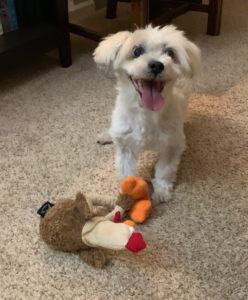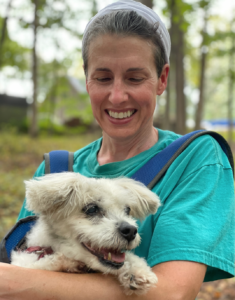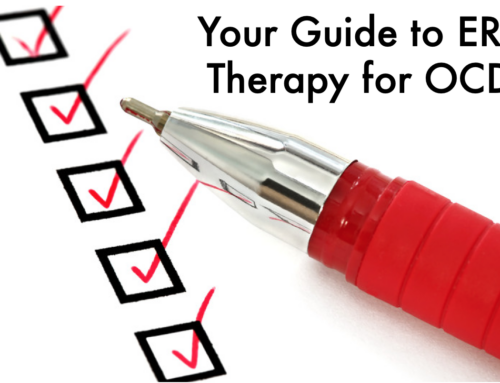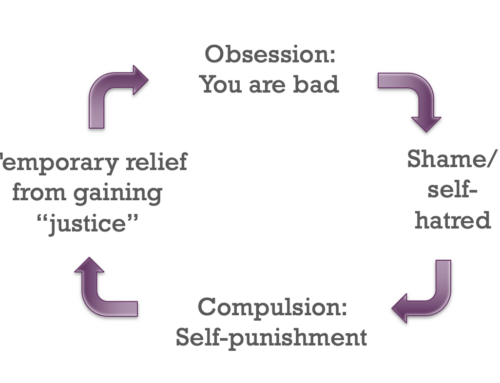Regret is keeping some secrets from you. The first I discussed in my previous blog post, and the second is that regret can often ride the coattails of other powerful emotions.
Shoulding yourself
 Many times regret is preceded by thoughts such as, “I should have done [fill in the blank]”, and the word “should” is the basis for shame. It’s hard to find a should statement that doesn’t cause this powerful emotion:
Many times regret is preceded by thoughts such as, “I should have done [fill in the blank]”, and the word “should” is the basis for shame. It’s hard to find a should statement that doesn’t cause this powerful emotion:
- I should give more to charity.
- I should be nicer.
- I should exercise more.
- I should lose weight, etc….
All of these statements point to some personal failing and create emotions that go beyond guilt. Guilt comes from the thought “I did something bad,” but shame comes from the more toxic thought “I am bad,” as in, what’s wrong with me that I’m not giving more to charity, or being nicer, or exercising more, etc…?
Regret can sit on a core of shame
If we ruminate on the thought “I should have made a different decision / done something differently, etc.….,” as those of us with OCD can be exceptionally prone to doing, we’re shaming ourselves for a choice we made in the past. And there’s nothing we can do to go back and change things, so our “moral failing” feels frozen in time. Unfixable. Proof that in that moment, we just weren’t good enough. As a result, we feel what we’d probably call regret, but the regret is sitting on top of a core of shame.
An antidote for regret: self-compassion
 So how do you deal with regret when it’s a derivative of shame? With self-compassion, knowing that everyone makes the best decisions they can based on the information they have available to them at the time—including you. To quote Elisha Goldstein, “Forgive yourself for not knowing what you didn’t know before you learned it.”
So how do you deal with regret when it’s a derivative of shame? With self-compassion, knowing that everyone makes the best decisions they can based on the information they have available to them at the time—including you. To quote Elisha Goldstein, “Forgive yourself for not knowing what you didn’t know before you learned it.”
I’ll give you a recent personal example of how I’ve used self-compassion to deal with regret. At the beginning of April this year, my precious dog Bella, who I’d had for 15 years, passed away.
In the past when I’ve lost pets, I’ve not only experienced grief, but a torrent of shame-induced regret that quickly spiraled into depression, as I describe in this excerpt from Is Fred in the Refrigerator? Taming OCD and Reclaiming My Life:
Beginning the day I lost [my pet], I took out my previously mothballed veil of depression and wrapped it tightly around my suffering, replaying [my pet]’s final moments in my mind. I flagellated myself for not having acted sooner, for having been such a workaholic that I hadn’t noticed something was gravely wrong with [my pet]. The mental wounds I created, my self-imposed sentence in a prison of grief, made the veil even more necessary, as I felt too raw to expose myself to the outside world. I was too incapacitated to even don the Disneyesque façade I’d so adeptly assumed to hide my anguish in the past. (p. 153).
A kinder way to grieve … and to live
 With Bella’s loss, I was determined not to do that to myself again. Every time my mind tried to bring up thoughts like “you should have done this” or “what if you had done that?” I countered them with self-compassion, saying things to myself such as “I feel intense grief right now. Anyone who had the bond I had with Bella would feel this way. I’m going to treat myself kindly and focus on all the good times she and I together, as I know she’d want me to remember the fun we had and all the ways we enriched each other’s lives.”
With Bella’s loss, I was determined not to do that to myself again. Every time my mind tried to bring up thoughts like “you should have done this” or “what if you had done that?” I countered them with self-compassion, saying things to myself such as “I feel intense grief right now. Anyone who had the bond I had with Bella would feel this way. I’m going to treat myself kindly and focus on all the good times she and I together, as I know she’d want me to remember the fun we had and all the ways we enriched each other’s lives.”
This time around, my experience with grief has been much different than the one I described in Fred. I’ve experienced all the wave-like stages of grief (and still do), but I’m not turning any of them against myself. I notice the thoughts of regret, but I use my Shoulders Back skills to not engage with them, just as I would do with intrusive thoughts that trigger OCD, and instead give myself compassion.
My self-compassion practice has made all the difference in not only how I’ve experienced grief, but the quality of my life during this time. For instead of focusing on all I might have done wrong, I’m focusing on all the things that were right about my time with Bella. While I can still feel intense sadness and will always miss her energetic and life-loving presence, my focus on self-compassion has transformed my grief from a self-imposed prison into a celebration of my beloved dog’s life.
Self-compassion resources
 To learn more about self-compassion and how it can transform the quality of your life, please see the following resources:
To learn more about self-compassion and how it can transform the quality of your life, please see the following resources:
On this website
- Aha! Moments from Self-Compassion
- Don’t Talk to Me Like That!
- Show yourself some love!
- Excerpt from The Self-Compassion Workbook for OCD
Books
- The Self-Compassion Workbook for OCD: Lean into Your Fear, Manage Difficult Emotions & Focus On Recovery.
- Everyday Mindfulness for OCD: Tips, Tricks & Skills for Living Joyfully
Learn more about taming OCD
Sign up for my Shoulders Back! newsletter to receive OCD-taming tips & resources, including notifications of new blog posts, delivered every month to your inbox.
My blogs are not a replacement for therapy, and I encourage all readers who have obsessive compulsive disorder to find a competent ERP therapist. See the IOCDF treatment provider database for a provider near you. And never give up hope, because you can tame OCD and reclaim your life!
Photo of woman (c) Canstockphoto







Thank you! I have real life regret ocd and your articles are the first that actually get what I’m experiencing.